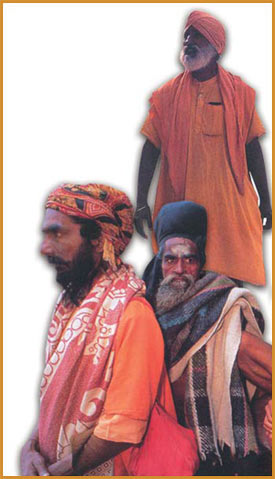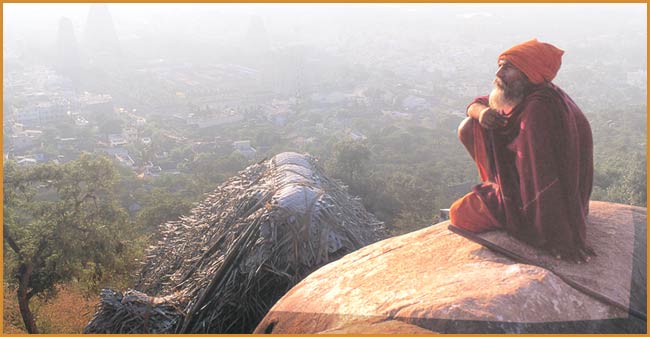
Hindu recluses believe that a life of hunger, destitution and pain will lead them to Brahma. Their state of self-inflicted suffering is an aberration disapproved of by Islam. Allah says in the Qur’an that “He does not want any injustice for His servants” (Surah Ghafir: 31)
The first religion that springs to mind when Eastern Religions are mentioned is the superstitious religion of Hinduism with its 900 million followers. This is a significant number. Around 15% of the world population follows Hinduism and a great proportion of India, Nepal and Indonesia are Hindu. Approximately 90% of India’s population or 700 million of its people believe in Hinduism.
Strictly speaking it is wrong to call Hinduism a religion, because whereas Islam, Christianity and Judaism (though Christianity and Judaism were altered after their revelation) are true religions based on Divine revelation, Hinduism is a philosophy, a way of life and a culture originating from superstitious traditions that developed over many centuries. When we say “Hinduism is a false religion”, we are speaking of the centuries old pagan Hindu culture.
Throughout history the lands around the Indus River have been populated by different cultures with different beliefs and traditions. India has been occupied many times. The oldest known conquerors of these lands are the Aryans who, descended from the North West and occupied Northern India between BC 2500-1500. This was not just a military occupation of Indian lands; the Aryans established their own civilization formed by synthesizing their own culture with elements of the native traditions. Whilst the native Indians were dark-skinned, Aryans were a white-skinned and tall race and the new culture was racist; it privileged the whites at the expense of the native population.
The Vedas written by the Aryans in Sanskrit around 1000 BC are generally acknowledged to be the oldest known Hindu texts. In the subsequent periods more texts by different authors were added to the Vedas, which when combined, became acknowledged as the so-called sacred texts of Hinduism containing the perverted beliefs of the superstitious Hindu religion. Hinduism is therefore a “man-made” belief system based on the texts of the Aryan warriors who conquered India as opposed to Allah’s revelation. With the British occupation of India in 1829 this perverse faith began to be called Hinduism, which is an amalgamation of myth, pagan texts, ancient and primitive traditions, folklore, rituals and practices. In addition, it is not possible to define it as a religion based on a single source book, established rules or a certain founder. Hinduism changes from village to village, town to town, even from family to family and these differences prove that it is a “personal, pagan way of life.” The author of History of Hindu Imperialism, Swami Dharma Theertha explains:Frankly speaking, it is not possible to say definitely who is a Hindu and what Hinduism is. These questions have been considered again and again by eminent scholars, and so far no satisfactory answer has been given. Hinduism has within itself all types of religions such as theism, atheism, polytheism, Adwitism, Dwaitism, Saivism, Vaishnavism, and so forth. It contains nature worship, ancestor worship, animal worship, idol worship, demon worship, symbol worship and self worship. Its conflicting philosophies will confound any ordinary person. From barbarous practices and dark superstitions, up to the most mystic rites and sublime philosophies, there is place for all gradations and varieties in Hinduism. Similarly, among the Hindu population there are half barbarian wild tribes, and depressed classes and untouchables, along with small numbers of cultured, gentle natures and highly evolved souls.3

Hindu recluses walk the streets semi-naked, hungry and thirsty. Hair and beard are indiscernible and their appearance is filthy and dusted. They consider this way of life a virtue. These practices under the name of worship will neither benefit them on earth nor in the hereafter.
Independent India’s first prime minister (1947-1964) Pandit Nehru defines Hinduism in a similar way:
“Hinduism, as a faith, is vague, amorphous, many-sided, all things to all men. It is hardly possible to define it, or indeed to say definitely whether it is a religion or not, in the usual sense of the word. In its present form, and even in the past, it embraces many beliefs and practices, from the highest to the lowest, often opposed to or contradicting each other.”4

We only send the Messengers to bring good news and to give warning. Those who disbelieve use fallacious arguments to deny the truth. They make a mockery of My Signs and also of the warning they were given. (Surat al-Kahf: 56)
To sum up, Hinduism permits idolatry, the lowest forms of paganism, and unites people who worship satan, idols, trees, mountains, rivers and plants under one heretical system of belief. People are free to choose which idols they serve or to make some of their own, to create their own form of deviating beliefs and to bless them in their own shallow minds. This twisted mentality makes Hinduism, which is a wholly corrupted system of belief with its 300 million odd idols, a perverse religion and a dark way of life with endless variations. It is an oppressive and totalitarian way of life that controls it adherents round the clock. We will examine superstitious Hindu traditions, inter personal relations, and unjust social system in great detail over the next few chapters. It is possible to see it everywhere in life; in a twisted nationalism that is more akin to racism, in its hostility towards other nations, in national policies and in every other aspect of life, from how to eat to how to wash. Hindus believe that if they live their whole lives according to Hindu scriptures, they will be on the “right path”. Because of this, they make a grave error by being a Hindu as it cannot provide anything of benefit in this life, or the hereafter. Hinduism is a false religion that is destined to be wiped off the face of the earth in light of the true faith. Our Lord states:
Say: “Truth has come and falsehood has vanished. Falsehood is always bound to vanish.” (Surat al-Isra’: 81)
3. Swami Dharma Theertha, History of Hindu Imperialism, Madras, 1992, s. 178. http://www.geocities.com/Athens/Agora/4229/in15.html
4. Jawaharlal Nehru, The Discovery of India, New Delhi, 1983, s. 75. http://www.geocities.com/Athens/Agora/4229/in15.html